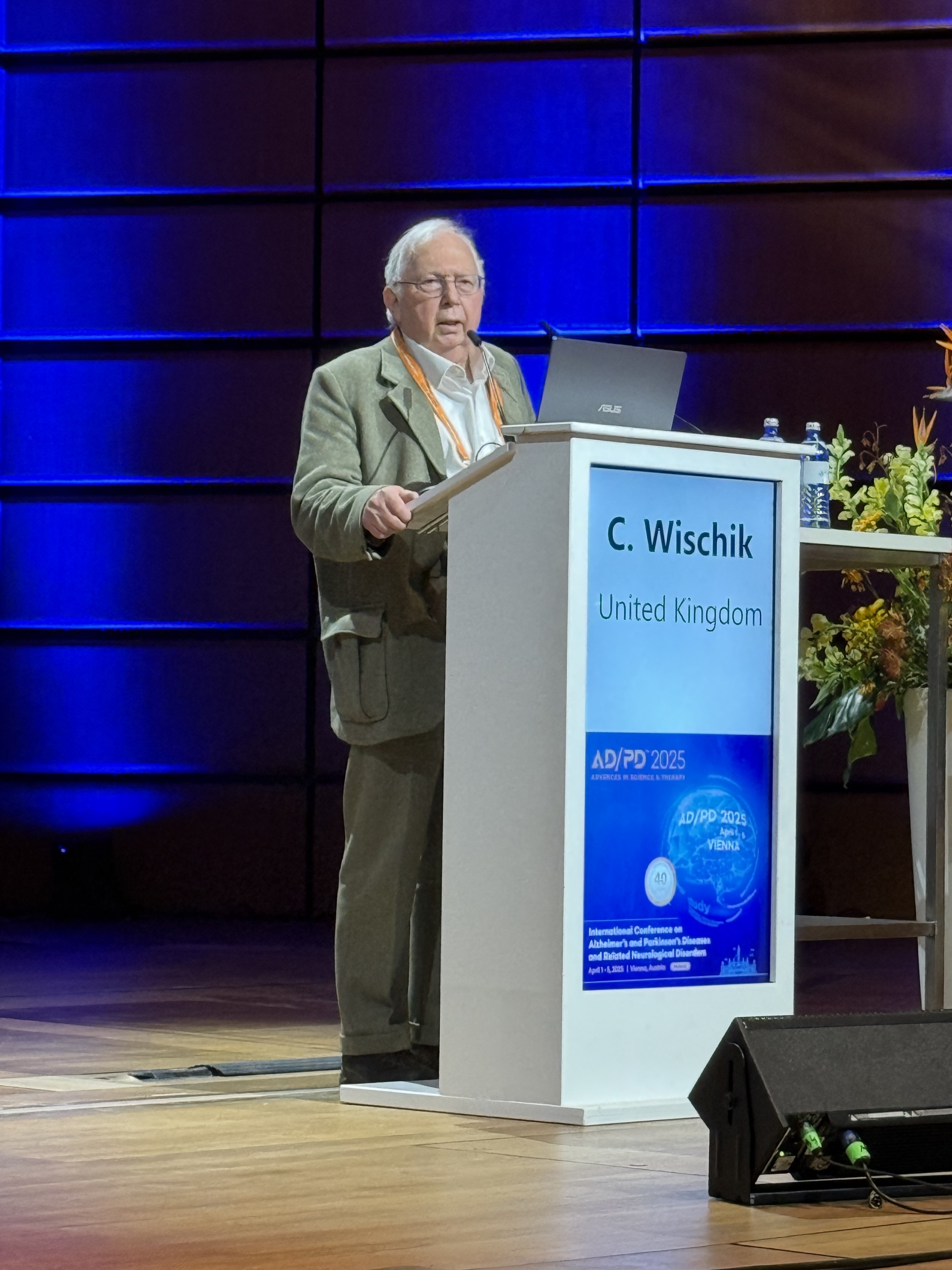For Chinese translation click here
点击此处查看中文翻译
Researchers have reported a potential oral treatment for Alzheimer’s disease that slowed its progression over a period of at least 18 months.
Developed by Singaporean company TauRx Pharmaceutics Ltd, the scientists based in Aberdeen report that hydromethylthionine mesylate (HMTM) could be the first oral treatment for Alzheimer’s disease (AD) that targets the tau protein pathology – if it is approved by regulators.
The findings were revealed at leading international conference AD/PD 2025 in Vienna, which concluded on Saturday. At the event, TauRx Pharmaceuticals CEO and co-founder Professor Claude Wischik outlined work which compared results from HMTM’s recent Phase 3 trial with placebo data from closely matched subjects available from the Critical Path in AD (CPAD) Institute database, which contains information from nearly 10,000 patients that have taken part in 36 global trials.
Prof Wischik, who led the research, said: “The results, which were consistent across three different analyses comparing HMTM with external data, show that HMTM is effective in reducing clinical decline and brain atrophy progression over a period of at least 18 months, with potentially clinically meaningful treatment benefits lasting up to two years.
“We believe that HMTM has the potential to be a safe and accessible oral treatment option for early to mild/moderate AD which could be delivered with minimal patient and physician burden.
“Although this is not a cure, the research suggests that starting HMTM treatment early in the disease process can substantially delay progression. The combination of a strong safety profile, as evidenced from trials involving more than 3,000 patients, and oral administration leads us to believe we have a drug that people would be able to take in the same way they take other prescription medication.”
TauRx has submitted a Marketing Authorisation Application for HMTM to the UK’s Medicines and Healthcare products Regulatory Agency (MHRA), while the company is also engaged with the National Institute for Health and Care Excellence (NICE) to assess the suitability of the medicine for use on the NHS.
The comparison using the ADAS-cog13 scoring system, which measures the ability to undertake tasks such as recalling words and remembering test instructions, showed patients with early disease taking HMTM did not decline significantly from their baseline score over 18 months, in contrast to the substantial decline seen in the CPAD placebo data.
In addition, examination of the Clinical Dementia Rating (CDR) scale used to provide a global assessment of dementia severity showed similar results, with progression of brain atrophy, an objective indicator of neurodegeneration, also significantly reduced for the HMTM data.
Tau protein has been at the forefront of Prof Wischik’s work since his discovery in 1988 that the Alzheimer tangle was made up of abnormally assembled tau protein forming destructive filaments inside nerve cells in the brain.
While several other drugs have focused on amyloid protein, HMTM has a different mode of action in that it targets the abnormal assembly of tau protein. It is also the only oral tau therapeutic to have completed Phase 3 trials.
研究人员报告称,可能存在一种口服疗法,可在至少18个月内延缓阿尔茨海默病病情恶化。
由新加坡公司卓睿药业(TauRx Pharmaceuticals Ltd)研发、总部位于阿伯丁的科学家团队表示,若获监管机构批准, 甲磺酸氢甲硫堇(HMTM)或将成为首款针对tau蛋白病理的阿尔茨海默病(AD)的口服疗法。
该发现公布在“2025国际阿尔兹海默症和帕金森氏病会议(AD/PD 2025)”上,该会议于上周六在维也纳落幕。会上,卓睿(TauRx)首席执行官兼联合创始人克劳德·维希克教授(Prof Claude Wischik)展示了HMTM近三期临床试验的结果,并与来自“阿尔茨海默病关键路径(CPAD)研究所”数据库中严格匹配的安慰剂组数据进行了对比。该数据库涵盖全球36项试验近10,000名患者的信息。
作为领导此项研究的维希克教授表示:“通过三项不同的分析方法将HMTM与外部数据对比,结果一致显示:HMTM可在至少18个月内有效减缓临床衰退以及脑萎缩,且在临床意义的疗效可能持续两年时间。”
“我们相信,HMTM有望为早期至轻/中度AD患者提供安全、便捷的口服治疗选择,其使用对于患者和医生来说负担极小。”
“尽管AD无法根治,但研究表明,在AD早期启动HMTM治疗可大幅延缓病情恶化。该药物在3,000多名患者的试验中展现出良好的安全性,加之口服给药方式,我们相信其将像其他处方药一样易于使用。”
目前,新加坡卓睿药业已向英国药品与保健品管理局(MHRA)提交HMTM的上市许可申请,并正与英国国家卫生和临床技术优化研究所(NICE)合作评估该药物纳入英国国民医疗体系(NHS)的适用性。
阿尔茨海默病评定量表-认知分量表(ADAS-cog13)评分系统用于评估患者执行任务的能力,如回忆词语和记忆测试指令。通过对比显示:早期AD患者服用HMTM后,18个月内基线评分未显著下降,而CPAD安慰剂组则呈现大幅衰退。
此外,用于评估痴呆严重程度的“临床痴呆评定量表(CDR)”显示类似结果。作为神经退化的客观指标,HMTM组的脑萎缩也显著减缓。
1988年,维希克教授发现阿尔茨海默病神经纤维缠结是由异常聚集的tau蛋白构成,这些蛋白在大脑神经细胞内形成破坏性纤维。自此以后,tau蛋白一直是其研究的核心。
目前多数药物聚焦于淀粉样蛋白,而HMTM的作用机制独特——靶向tau蛋白异常聚集。它也是唯一完成三期试验的口服tau疗法。






